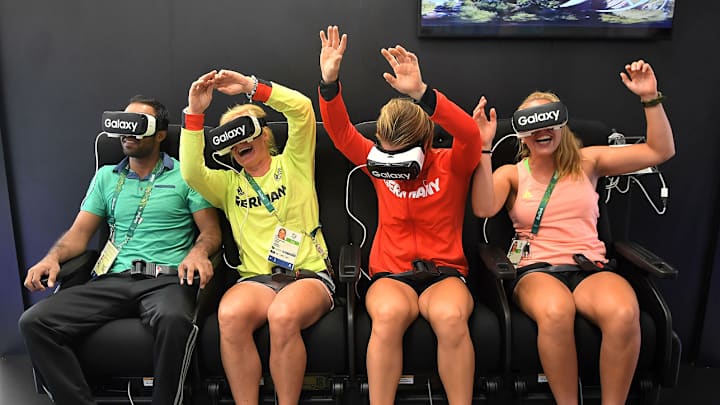Five unique uses of Virtual Reality at the Rio Olympics

Read about the latest sports tech news, innovations, ideas and products that impact players, fans and the sports industry at SportTechie.com.
Virtual reality (VR) has received a tidal wave of attention over the last several years. The expanding technology has impacted the online world of video games, sports, and it is even changing how people are educated. Now as the 2016 Olympics carry on in Brazil, VR is also making an appearance on the world’s biggest sporting stage in innovative ways. Below are five examples of VR being implemented at this year’s Olympics that could make the Rio Games the event that technology historians point to as the tipping point for VR going mainstream.
1. Broadcasts
NBCUniversal, which holds Olympic broadcast rights in the United States, is providing viewers over 100 hours of VR footage. In addition to the opening and closing ceremonies, full broadcasts of each sport, along with highlight packages are available on a next-day basis. A full schedule of the events being streamed can be found here.
The BBC is also introducing a Virtual Reality service, which they describe as “experimental,” for viewers in the United Kingdom. The broadcaster plans to deliver 100 overall hours of 360-degree video in a fashion that will be similar to NBC model, available to iOS, Android and VR headset users.
2. Hardware and software
Of course, with all this footage being filmed in VR format, there needs to be unique means to watch it all. As the official smartphone partner of the Games, Samsung, and its Gear VR headset, will provide its audience with the immersive views from the center of the action.
Users who own one of Samsung’s numerous compatible phones will need to download the free NBC Sports app and authenticate their cable or satellite provider in order to gain access to the content.
The BBC has its own Samsung Gear VR-compatible app, BBC Sport 360, to go along with its VR service. The coverage of the Games can also be viewed in 360 degrees through BBC Taster website.
Sports Illustrated brings the stars of the Rio Olympics together for exclusive cover shoot
3. VR-Vantage
Thanks to the VR-Vantage, the England’s Olympians have been able to prepare for the unfamiliarity of the courses and venues in Brazil through 360-degree, 3-D footage. Jointly created by BAE Systems and British government organization UK Sport, the main purpose is to help athletes learn environments thoroughly. Those competing in sailing, canoe slalom and the triathlon could theoretically have benefited from using the device as they mentally train for what’s ahead.
Subscribe to the
SportTechie Newsletter
- Kings' new arena was designed with Sacramento in mind
- Does AI have a future in the Olympics?
- LA Galaxy solidify partnership with Match Analysis
4. VR tours
At the Museu Cidade Olimpica (Olympic City Museum), located just north of Rio de Janeiro, visitors can see many different popular locations and sporting venues around the city. Using special headsets, users are immersed in VR footage shot from the air over places like Deodoro, Barra and even Copacabana beach.
5. 360-degree virtual tour
Want to see and learn about Rio de Janeiro for yourself but don’t plan on traveling there anytime soon? Google Maps has produced a 360-degree virtual tour called Beyond the Map in which users can explore points of interest around Rio for themselves. This tour is accessible through mobile browser or on YouTube where products like Google Cardboard can be used. Take in the surroundings as you ride through the city or admire the amazing views from Corcovado Mountain where Christ the Redeemer scrapes the sky.
